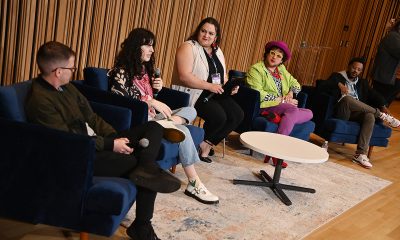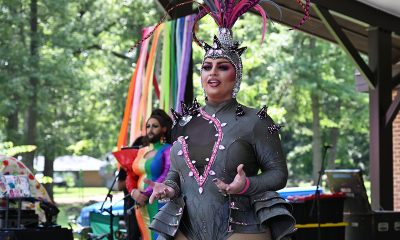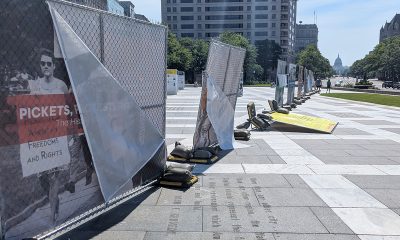Theater
An autistic, nonbinary, creative type takes center stage in new play
‘Tornado Tastes Like Aluminum Sting’ featured at W.Va. festival
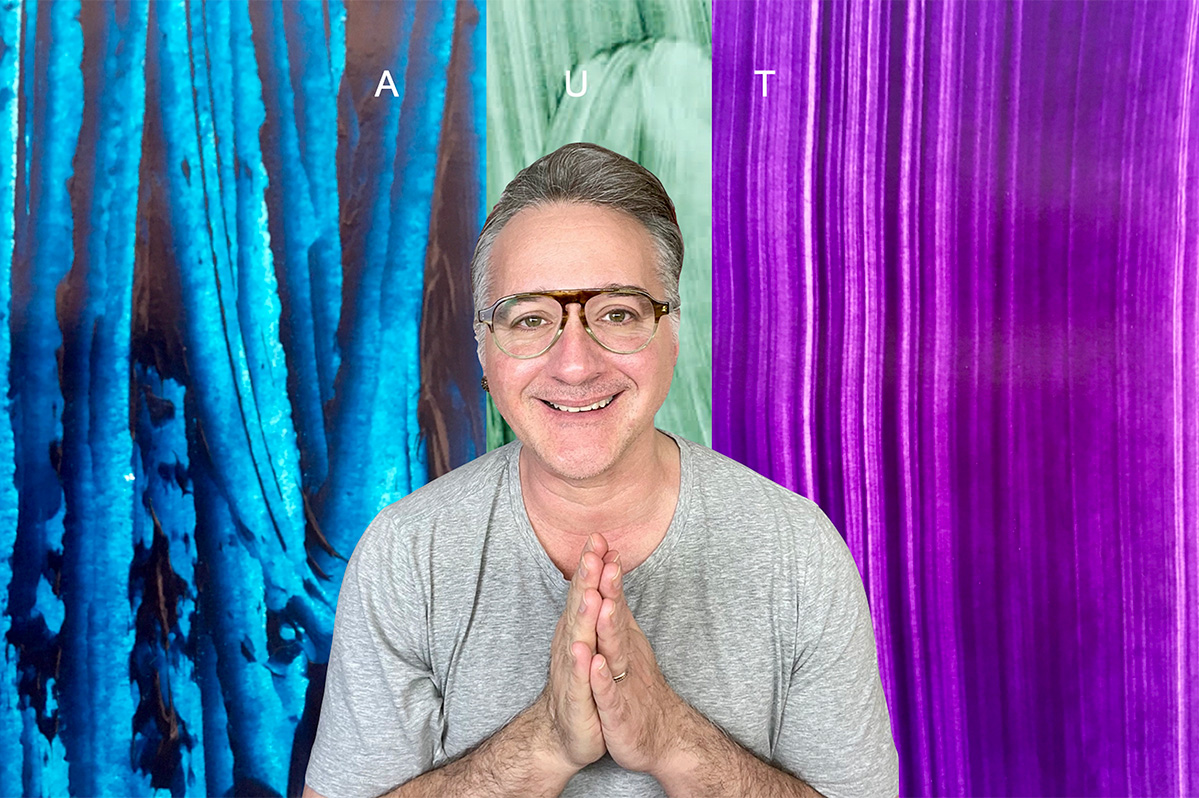
Contemporary American Theater Festival
Through July 28
Shepherdstown, W.Va.
Catf.org
For their new uniquely titled play, “Tornado Tastes Like Aluminum Sting,” Harmon Dot Aut draws heavily from life. Like the playwright, the new work’s central character Chantal Buñuel, called CB for short, is an autistic, nonbinary creative with synesthesia, a condition that causes some people to experience more than one sense simultaneously (like tasting words for instance).
But how much of Harmon’s three hander, currently making its world premiere at the annual Contemporary American Theater Festival (CATF) at Shepherd University in historic, queer-friendly Shepherdstown, W.Va. (just a 90-minute drive from D.C.), is specifically autobiographical?
Parts are imagined but location and circumstances are pretty exact, they explain via phone during a rehearsal break. The story unfolds in rural Kansas surrounded by relative poverty; the family doesn’t have much, but they’re loving.
“Often when I see people depicted from rural areas who don’t have a lot of money, we’re invited to make fun of them. I wanted to make sure I created people who were smart, who fought hard, who loved hard. Who loved their child and had some grace.”
Throughout the 90-minute Oliver Butler-directed production, teenage CB (played by Jean Christian Barry) speaks to the audience in the intimate Studio 112, one of CATF’s smaller spaces, inviting theatergoers into their world, to experience their brain from the inside.
“It’s not really structured like other plays,” says Harmon, “Chantal is a character you’ve never seen represented on stage before, a story artfully revealed through projections, lights, and live feed.
“I wanted to give them a sense of self that’s very strong, non-wavering. An asset in less tolerant, rural Kansas. Chantal, who becomes a filmmaker, sees a lot of life through a camera lens. They’re a character who’s autistic and nonbinary but who also has agency, a spark and need to go forward. I call it ‘the fuck you’ spark. No matter what happens you move forward.”
The Hudson Valley-based playwright wrote their first iteration of “Tornado Tastes Like Aluminum Sting” in 2008. Harmon says “It took a while for folks to get on board, to use the word neurodivergent. That was its genesis. I kept working on it. And now I’m here having it produced, which is fabulous.”
For the young, undiagnosed Harmon, playwriting came instinctively. As a kid they’d record music off the radio and things they’d made up on their Playskool recorder. Then they’d take the tape out and cut and splice and make their own recordings.
“I was making plays but didn’t know it, trying to understand a world that was incomprehensible to me.”
Harmon studied acting at a small college in Kansas. After graduating, they bravely jumped on a bus and traveled the country. “That was my true education. I was constantly writing, and I did standup.”
A recipient of a Visionary Playwright Award, and founding member of the notorious gay sketch comedy troupe, Hot Dish! they’re enjoying their time in charming Shepherdstown, an accepting enclave where Confederate banners give way to a sea of rainbows.
Other CATF offerings include Mark St. Germain’s “The Happiest Man On Earth,” the true story of Holocaust survivor Eddie Jaku.
Out playwright Donja R. Love’s “What Will Happen To All That Beauty?” is described as an epic work about Black people living with HIV/AIDS exploring “questions of legacy, family, and healing against the haunting landscape of the AIDS crisis of the 80s and its enduring impact.”
Paloma Nozicka’s “Enough To Let The Light In” is a smart, spooky play about “girlfriends Marc and Cynthia who spend an night celebrating a milestone, but over the course of the evening, their lives are irrevocably changed as buried secrets begin to emerge.”
Nozicka, an ardent queer ally based in L.A, says “For a while I’d wanted to write work reflective of queer friends who don’t get to play queer characters. And when they do, they feel it’s tokenism, and that the characters are less than nuanced,”
She adds “Friends who’ve acted in the play tell me it’s the first time they’ve ever played a lesbian on stage and they’ve been acting twenty years.
“I feel there should be more opportunities for people to be playing who are they are.”
Theater
‘Hunter S. Thompson’ an unlikely but rewarding choice for musical theater
‘Speaks volumes about how sad things land on our country’

‘The Untitled Unauthorized Hunter S. Thompson Musical’
Through July 13
Signature Theatre
4200 Campbell Ave., Arlington, Va.
$47 to $98
Sigtheatre.org
The raucous world of the counterculture journalist may not seem the obvious choice for musical theater, but the positive buzz surrounding Signature Theatre’s production of Joe Iconis’s “The Untitled Unauthorized Hunter S. Thompson Musical” suggests otherwise.
As the titular, drug addled and gun-toting writer, Eric William Morris memorably moves toward his character’s suicide in 2005 at 67. He’s accompanied by an ensemble cast playing multiple roles including out actor George Salazar as Thompson’s sidekick Oscar “Zeta” Acosta, a bigger than life Mexican American attorney, author, and activist in the Chicano Movement who follows closely behind.
Salazar performs a show-stopping number — “The Song of the Brown Buffalo,” a rowdy and unforgettable musical dive into a man’s psyche.
“Playing the part of Oscar, I’m living my Dom daddy activist dreams. For years, I was cast as the best friend with a heart of gold. Quite differently, here, I’m tasked with embodying all the toxic masculinity of the late ‘60s, and a rampant homophobia, almost folded into the culture.”
He continues, “My sexuality aside, I like to think that Oscar would be thrilled by my interpretation of him in that song.
“Our upbringings are similar. I’m mixed race – Filipino and Ecuadorian and we grew up similarly,” says Salazar, 39. “He didn’t fit in as white or Mexican American, and fell somewhere in the middle. Playing Oscar [who also at 39 in 1974 forever disappeared in Mexico], I pulled out a lot of experience about having to code switch before finally finding myself and being confident just doing my own thing.
“As we meet Oscar in the show we find exactly where’s he’s at. Take me or leave me, I couldn’t care less.”
In 2011, just three years after earning his BFA in musical theater from the University of Florida in Gainesville, Salazar fortuitously met Iconis at a bar in New York. The pair became fast friends and collaborators: “This is our third production,” says George. “So, when Joe comes to me with an idea, there hasn’t been a moment that I don’t trust him.”
In “Be More Chill,” one of Iconis’s earlier works, Salazar originated the role of Michael Mell, a part that he counts as one of the greatest joys of artistic life.
With the character, a loyal and caring friend who isn’t explicitly queer but appeals to queer audiences, Salazar developed a fervent following. And for an actor who didn’t come out to his father until he was 30, being in a place to support the community, especially younger queer people, has proved incredibly special.
“When you hear Hunter and Oscar, you might think ‘dude musical,’ but I encourage all people to come see it.” Salazar continues, “Queer audiences should give the show a shot. As a musical, it’s entertaining, funny, serious, affecting, and beautiful. As a gay man stepping into this show, it’s so hetero and I wasn’t sure what to do. So, I took it upon myself that any of the multiple characters I play outside of Oscar, were going to be queer.
Queer friends have seen it and love it, says Salazar. His friend, Tony Award-winning director Sam Pinkleton (“Oh, Mary!”) saw Hunter S. Thompson at the La Jolla Playhouse during its run in California, and said it was the best musical he’d seen in a very long time.
“Since the work’s inception almost 10 years ago, I was the first Oscar to read the script. In the interim, the characters’ relationships have grown but otherwise there have been no major changes. Still, it feels more impactful in different ways: It’s exciting to come here to do the show especially since Hunter S. Thompson was very political.”
Salazar, who lives in Los Angeles with his partner, a criminal justice reporter for The Guardian, is enjoying his time here in D.C. “In a time when there are so many bans – books, drag queens, and travel — all I see is division. This is an escape from that.”
He describes the Hunter Thompson musical as Iconis’s masterpiece, adding that it’s the performance that he’s most proud of to date and that feels there a lot of maturity in the work.
“In the play, Thompson talks to Nixon about being a crook and a liar,” says Salazar. “The work speaks volumes about how sad things land on our country: We seem to take them one step forward and two steps back; the performance is almost art as protest.”
Theater
A hilarious ‘Twelfth Night’ at Folger full of ‘elegant kink’
Nonbinary actor Alyssa Keegan stars as Duke Orsino
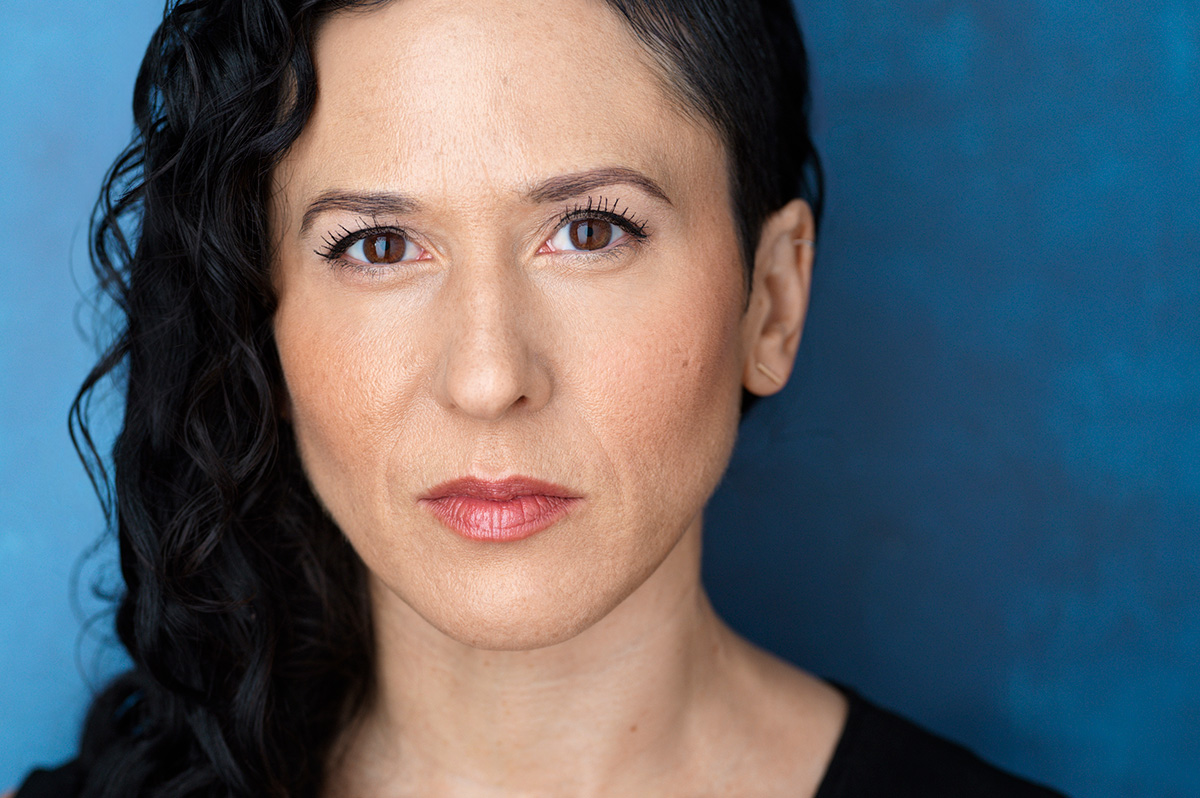
‘Twelfth Night’
Through June 22
Folger Theatre
201 East Capitol St., S.E.
$20-$84
Folger.edu
Nonbinary actor Alyssa Keegan (they/them)loves tapping into the multitudes within.
Currently Keegan plays the melancholic Duke Orsino in Folger Theatre’s production of Shakespeare’s romantic comedy “Twelfth Night.” Director Mei Ann Teo describes the production as “sexy, hilarious, and devastating” and full of “elegant kink.”
Washington-based, Keegan enjoys a busy and celebrated career. Her vast biography includes Come From Away at Ford’s Theatre; Cat on a Hot Tin Roof (Helen Hayes Award, Best Actress) and Paula Vogel’s How I Learned to Drive, both at Round House Theatre; Diana Son’s Stop Kiss directedby Holly Twyford for No Rules Theatre Company; and Contractions at Studio Theatre, to name just a few.
In addition to acting, Keegan works as a polyamory and ethical non-monogamy life and relationship coach, an area of interest that grew out of personal exploration. For them, coaching seems to work hand in hand with acting.
WASHINGTON BLADE: You’re playing the lovesick Orsino in Twelfth Night. How did that come about?
ALYSSA KEEGAN: The director was looking to cast a group of actors with diverse identities; throughout auditions, there were no constraints regarding anyone’s assigned sex at birth. It was really a free for all.
BLADE: What’s your approach to the fetching, cod-piece clad nobleman?
KEEGAN: Offstage I identify as completely nonbinary; I love riding in this neutral middle space. But I also love cosplay. The ability to do that in the play gives me permission to dive completely into maleness.
So, when I made that decision to play Orsino as a bio male, suddenly the part really cracked open for me. I began looking for clues about his thoughts and opinions about things like his past relationships and his decision not to date older women.
Underneath his mask of bravura and sexuality, and his firmness of feelings, he’s quite lonely and has never really felt loved. It makes sense to me why his love for Olivia is so misguided and why he might fall in love with the Cesario/Viola character.
BLADE: As an actor, do you ever risk taking on the feelings of your characters?
KEEGAN: Prior to my mental health education, yes, and that could be toxic for me. I’ve since learned that the nervous system can’t tell the difference between real emotional distress and a that of a fully embodied character.
So, I created and share the Empowered Performer Project. [a holistic approach to performance that emphasizes the mental and emotional well-being of performing artists]. It utilizes somatic tools that help enormously when stepping into a character.
BLADE: Has changing the way you work affected your performances?
KEEGAN: I think I’m much better now. I used to have nearly debilitating stage fright. I’d spend all day dreading going onstage. I thought that was just part of the job. Now, I’ve learned to talk to my body. Prior to a performance, I can now spend my offstage time calmly gardening, working with my mental health clients, or playing with my kid. I’m just present in my life in a different way.
BLADE: Is Orsino your first time playing a male role?
KEEGAN: No. In fact, the very first time I played a male role was at the American Shakespeare Center in Staunton, Va. I played Hipolito in Thomas Middleton’s The Revenger’s Tragedy.
As Hipolito, I felt utterly male in the moment, so much so that I had audience members see me later after the show and they were surprised that I was female. They thought I was a young guy in the role. There’s something very powerful in that.
BLADE: Do you have a favorite part? Male or female?
KEEGAN: That’s tough but I think it’s Maggie the Cat. I played the hyper-female Maggie in Tennessee Williams’ Cat on a Hot Tin Roof at Round House. In the first act she didn’t stop talking for 51 minutes opposite Gregory Wooddell as Brick who barely had to speak. That lift was probably the heaviest I’ve ever been asked to do in acting.
BLADE: What about Folger’s Twelfth Night might be especially appealing to queer audiences?
KEEGAN: First and foremost is presentation. 99% of the cast identify as queer in some way.
The approach to Shakespeare’s text is one of the most bold and playful that I have ever seen. It’s unabashedly queer. The actors are here to celebrate and be loud and colorful and to advocate. It’s a powerful production, especially to do so close to the Capitol building, and that’s not lost on any of us.
Theater
‘We Are Gathered’ a powerful contemplation of queer equality
Arena production dives fearlessly into many facets of same-sex connection
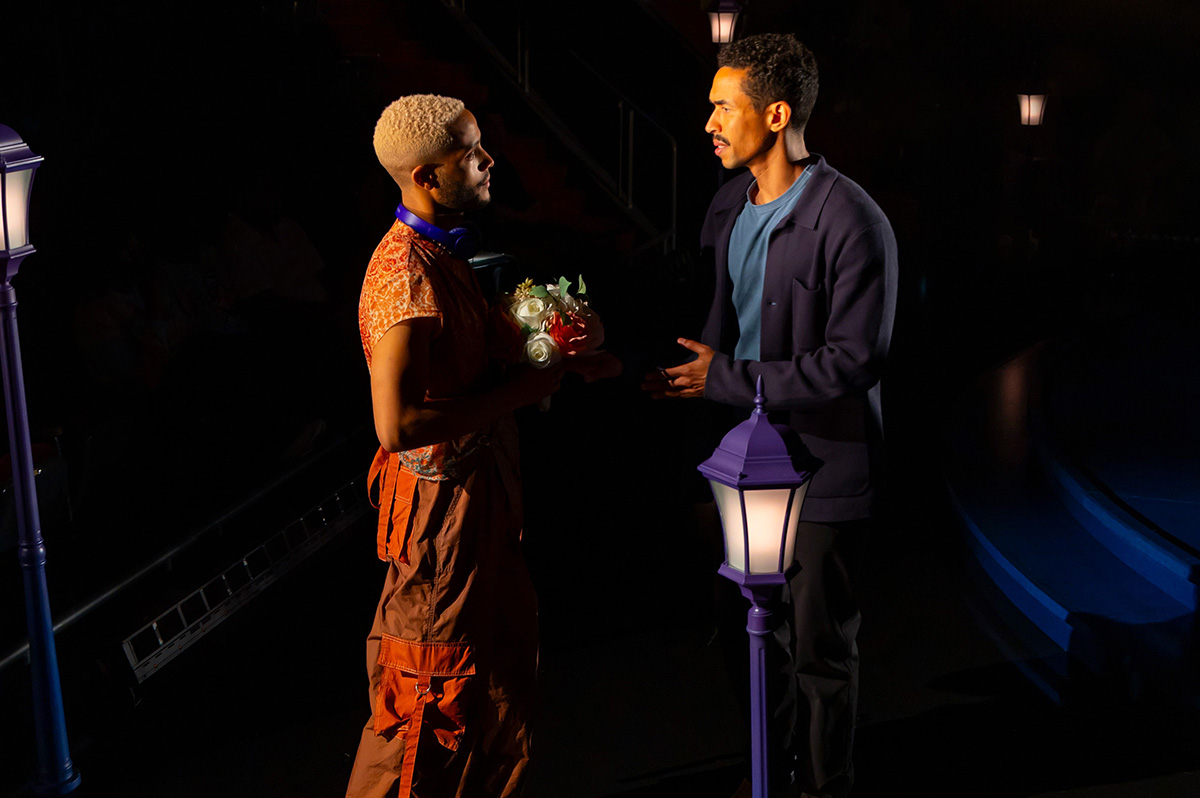
‘We Are Gathered’
Through June 15
Arena Stage
1101 Sixth St., S.W.
$70-$110
Arenastage.org
Aptly billed as a queer love story, Tarell Alvin McCraney’s terrific new play “We Are Gathered” (now at Arena Stage) dives deeply and fearlessly into the many facets of a same-sex connection and all that goes with it.
McCraney’s tale of two gay men’s romance unfolds entertainingly over two acts. Wallace Tre (Kyle Beltran), a tense architect, and his younger partner Free (Nic Ashe), a campy and fun-loving musician with a deep sense of quiet and peace are contemplating marriage after five years together, but one of the two isn’t entirely comfortable with the idea of imminent matrimony.
At 14, Wallace Tre (nicknamed Dubs) first learned about gay cruising via renowned British playwright Caryl Churchill’s seminal work “Cloud Nine.” It was an intoxicating introduction that led Dubs to an exciting world of sex and risk.
Soon after, a nearby park became a thrilling constant in his life. It remains a source of excitement, fun, danger, and fulfillment. The local cruising zone is also a constant in McCraney’s play.
One memorable evening, Dubs experienced a special night in the woods, a shadowy hour filled with exhilaration and surprise. That’s when Dubs unpredictably learned something he’d never felt before. That night in the park, he met and fell madly in love with Free.
In addition to being a talented playwright, McCraney is the Academy Award-winning Black and queer screenwriter of “Moonlight,” the 2016 film. He’s happy to be a part of WorldPride 2025, and grateful to Arena for making space for his play on its stage. McCraney says he wrote “We Are Gathered” as a contemplation of queer marriage and the right for same-sex couples, like opposite-sex couples, to marry anywhere in the United States.
For Dubs, it’s important that Free speak openly about how they met in the park. He’d like Free to share the details of their coming together with his supportive grandparents, Pop Pop (Craig Wallace) and Mama Jae (out actor Jade Jones). As far as they know, their grandson met Dubs at a lovely gathering with a nice crowd assembled under a swanky canopy. When in truth it was a park busy with horny guys cruising beneath a canopy of leafy verdure.
Understandably, Free is more than a tad embarrassed to reveal that he enjoyed al fresco sex with Dubs prior to knowing his boyfriend’s name. Clearly, in retrospect, both feel that their initial meeting is a source of discomfort, tinged with awkwardness.
There is a lot more to “We Are Gathered” than cruising. Dubs and Free are ardently liked by friends and family. Both are attractive and smart. Yet, they’re different. Free is quite easy going while Dubs is, at times, pricklier.
While Free is part of a happy family, Dubs’s people aren’t entirely easy. He grew up with a strung-out mother and a cold father (Kevin Mambo). Yet, his sister Punkin (Nikolle Salter), an astronaut, is very caring and close to him. While she doesn’t necessarily like “the gay stuff,” she very much wants to live in a world where there’s room for her gay brother.
Adeptly directed by Kent Gash, the production is memorable, and it’s not his first collaboration with McCraney. Ten years ago, Gash, who’s Black and queer, staged McCraney’s “Choir Boys” at Studio Theatre, another well-written and finely staged work.
“We Are Gathered” is performed in the round in Arena’s cavernous Fichandler Stage. The space is both a forest and various rooms created by designer Jason Sherwood and lighting designer Adam Honoré. It’s a world created by elevating a circular platform surrounded by charming street lamps both hanging overhead and lining the perimeter.
Ultimately, what takes place in “We Are Gathered” is a party, and something even more; it’s a paean to marriage, and a call to a sacrament.

